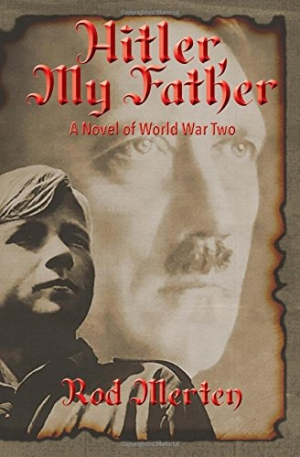Hitler, My Father
A Novel of World War Two, Hitler's Unknown Lover, and Son.
The novel’s potpourri of raw research snippets keeps the pages turning.
In the mid-1970s, a Frenchman named Jean-Marie Loret claimed to be the illegitimate son of Adolf Hitler and a French farm girl. Though the claim was never proven, it remains a popular speculation for researchers. From this idea, Rod Merten spins the alternate history novel, Hitler, My Father.
In this imagining, Hitler visits a small, isolated mountain in Austria, is entranced by an eighteen-year-old soloist who performs for him, and has her brought to her room. His decidedly creepy seduction of naïve, adoring Lotte results in pregnancy. Though Hitler is long gone and never to return, Lotte has fallen in love with him in the course of their night together, and will remain so to her dying day, ever claiming to be the proud mother of his son.
The novel unfolds as research done in 1991 by Lotte’s nephew, Lorenz, who has inherited her diaries and a trove of besotted letters she wrote to Hitler over the years, assuring him of her eternal love and updating him on Little Adolf’s growth and progress. Erich, a childhood friend who loved and outlived Lotte, opens the door to other sources and characters who will play a part in the story.
Despite the title, this is primarily the story of Lorenz’s research and the people he meets along the way. It unfolds as a potpourri of raw research snippets, most less than two pages in length and taking many forms—diaries, letters, conversations, interviews, and recreated memories. Though the wealth of these devices keeps the pages turning, the ever-shifting focus, which covers a range of years and veers frequently into the stories of tangential characters, makes for a fragmented read.
Lotte, whose letters and diary entries make her the book’s most heard-from character, is an opaque character throughout. The town disbelieves her and dismisses her claims as delusional. Her plight elicits sympathy.
As years go by, her devotion to Hitler increases, as do her fantastical excuses for his failures: When he fails to acknowledge her existence or his son’s, she decides he is doing so to protect her. When American planes fly overhead as the war ends, she asserts that clever Hitler has camouflaged German planes to take the enemy by surprise.
Lotte’s entries are obtuse and childishly self-centered, devoid of any awareness of the ongoing tragedy around her. Lacking details that garner empathy, her repetitive and increasingly delusional fan letters dance close to the line of grimly comic.
Lorenz, the book’s other anchoring character, is also something of a cipher. A sober, middle-aged professor, his sudden head-over-heels romance with a researcher whom he’s known for less than two weeks seems an abrupt insertion into the story, rather than a natural evolution.
Erich, Lotte’s childhood friend and protector, is the most fully developed and engaging character. Others in the story appear in such scattered short takes that their stories emerge as anecdotes rather than moving personal histories, while the use by WWII Austrians of twenty-first century American colloquialisms like “hooking up” is jarring.
After a leap of years from the postwar era to the Cold War, Hitler, My Father ends with a final twist that’s dark, wholly surprising, and unforeseen.
Reviewed by
Susan Waggoner
Disclosure: This article is not an endorsement, but a review. The publisher of this book provided free copies of the book and paid a small fee to have their book reviewed by a professional reviewer. Foreword Reviews and Clarion Reviews make no guarantee that the publisher will receive a positive review. Foreword Magazine, Inc. is disclosing this in accordance with the Federal Trade Commission’s 16 CFR, Part 255.

